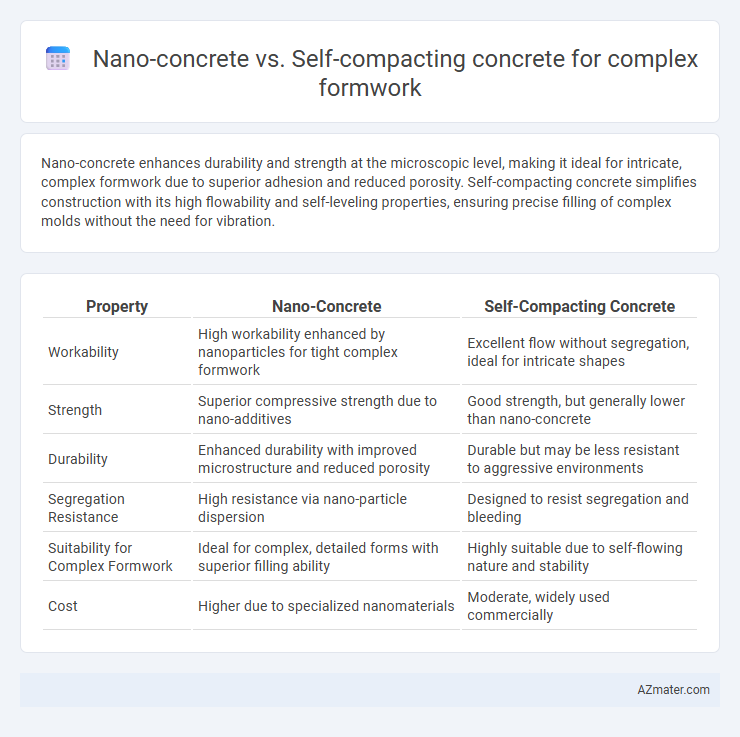Nano-concrete enhances durability and strength at the microscopic level, making it ideal for intricate, complex formwork due to superior adhesion and reduced porosity. Self-compacting concrete simplifies construction with its high flowability and self-leveling properties, ensuring precise filling of complex molds without the need for vibration.
Table of Comparison
| Property | Nano-Concrete | Self-Compacting Concrete |
|---|---|---|
| Workability | High workability enhanced by nanoparticles for tight complex formwork | Excellent flow without segregation, ideal for intricate shapes |
| Strength | Superior compressive strength due to nano-additives | Good strength, but generally lower than nano-concrete |
| Durability | Enhanced durability with improved microstructure and reduced porosity | Durable but may be less resistant to aggressive environments |
| Segregation Resistance | High resistance via nano-particle dispersion | Designed to resist segregation and bleeding |
| Suitability for Complex Formwork | Ideal for complex, detailed forms with superior filling ability | Highly suitable due to self-flowing nature and stability |
| Cost | Higher due to specialized nanomaterials | Moderate, widely used commercially |
Introduction to Nano-Concrete and Self-Compacting Concrete
Nano-concrete incorporates nanoparticles to enhance mechanical properties and durability, making it ideal for complex formwork that demands high strength and precision. Self-compacting concrete (SCC) flows effortlessly into intricate molds without the need for vibration, ensuring uniformity and reduced labor in complex formwork applications. Both materials improve construction efficiency, but nano-concrete emphasizes material performance while SCC prioritizes ease of placement and surface finish quality.
Key Characteristics of Nano-Concrete
Nano-concrete exhibits superior mechanical properties due to the incorporation of nanoparticles, which enhance its strength, durability, and microstructure compared to self-compacting concrete. Its high particle packing density and reduced pore size result in exceptional resistance to shrinkage and cracking, making it ideal for complex formwork with intricate geometries. The nano-scale additives improve hydration kinetics and bond strength, ensuring a dense and cohesive material that maintains workability without segregation during placement.
Distinct Properties of Self-Compacting Concrete
Self-compacting concrete (SCC) exhibits superior flowability and high deformability, allowing it to fill intricate and densely reinforced complex formwork without mechanical vibration. Its lower viscosity and stable segregation resistance ensure uniform material distribution and enhanced surface finish compared to nano-concrete. These distinct properties make SCC ideal for intricate architectural elements and structural forms where precision and consistency are critical.
Comparing Workability in Complex Formwork
Nano-concrete exhibits superior workability in complex formwork due to its enhanced particle packing and reduced water demand, allowing better flow without segregation or bleeding. Self-compacting concrete (SCC) also offers excellent workability with high fluidity and passing ability, but may require larger volumes of superplasticizers and viscosity modifiers to maintain stability in intricate molds. The nanomaterials in nano-concrete improve microstructure and rheology, making it more adaptable for casting complex geometries with minimal formwork vibration.
Strength and Durability: Nano vs. Self-Compacting Concrete
Nano-concrete demonstrates superior strength and durability compared to self-compacting concrete, attributed to the inclusion of nano-sized particles that fill micro-pores and enhance the material's density. Self-compacting concrete offers ease of placement in complex formwork but may exhibit slightly lower compressive strength and long-term durability due to its higher viscosity and reliance on admixtures. The enhanced microstructure of nano-concrete results in improved resistance to cracking, chemical attacks, and environmental degradation, making it more suitable for demanding structural applications.
Performance in Intricate Structural Designs
Nano-concrete exhibits superior performance in intricate structural designs due to its enhanced microstructure, which improves strength, durability, and resistance to cracking within complex formwork. Self-compacting concrete (SCC) offers excellent flowability and fills complex molds without segregation, ensuring uniformity in intricate shapes but may have slightly lower early strength compared to nano-modified mixes. The integration of nanoparticles in nano-concrete enhances bonding and mechanical properties, making it more suitable for high-precision, complex geometries where structural integrity is critical.
Cost Analysis and Economic Considerations
Nano-concrete incorporates nanoparticles that enhance material strength and durability, often leading to higher initial costs due to advanced raw materials and specialized processing techniques. Self-compacting concrete (SCC) reduces labor and formwork costs by flowing easily into complex formworks without the need for vibration, offering economic benefits through faster construction times and reduced manpower. While nano-concrete may entail higher upfront expenses, SCC provides cost-effective solutions for intricate formworks by minimizing additional handling and enabling quicker project completion.
Environmental Impact and Sustainability Factors
Nano-concrete demonstrates superior durability and reduced material consumption through enhanced nanoparticle integration, leading to lower carbon emissions compared to traditional mixes. Self-compacting concrete simplifies placement in complex formwork without mechanical vibration, minimizing labor energy and waste but may require higher cement content, affecting its carbon footprint. Considering sustainability, nano-concrete's improved mechanical properties and longer service life offer significant environmental benefits over self-compacting concrete in complex construction applications.
Real-World Applications in Complex Projects
Nano-concrete enhances durability and strength through nano-sized additives, making it ideal for complex formwork requiring high precision and structural integrity in complex projects like bridges and high-rise buildings. Self-compacting concrete offers superior flowability and self-leveling properties, reducing labor costs and formwork damage in intricate architectural elements and densely reinforced structures. In real-world applications, nano-concrete suits projects demanding advanced durability and performance, while self-compacting concrete excels in scenarios prioritizing workability and speed without compromising surface quality.
Future Trends and Innovations in Advanced Concrete Technologies
Nano-concrete exhibits enhanced mechanical properties and durability due to nano-scale additives, making it highly suitable for complex formwork with intricate geometries. Self-compacting concrete (SCC) offers superior flowability and reduced labor requirements, facilitating the construction of complex shapes without vibration. Future trends in advanced concrete technologies include integrating nanomaterials with SCC to combine optimal workability and strength, as well as developing smart concrete systems with self-healing and real-time monitoring capabilities for improved structural performance.

Infographic: Nano-concrete vs Self-compacting concrete for Complex formwork
 azmater.com
azmater.com